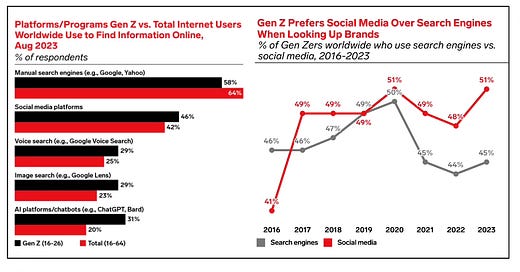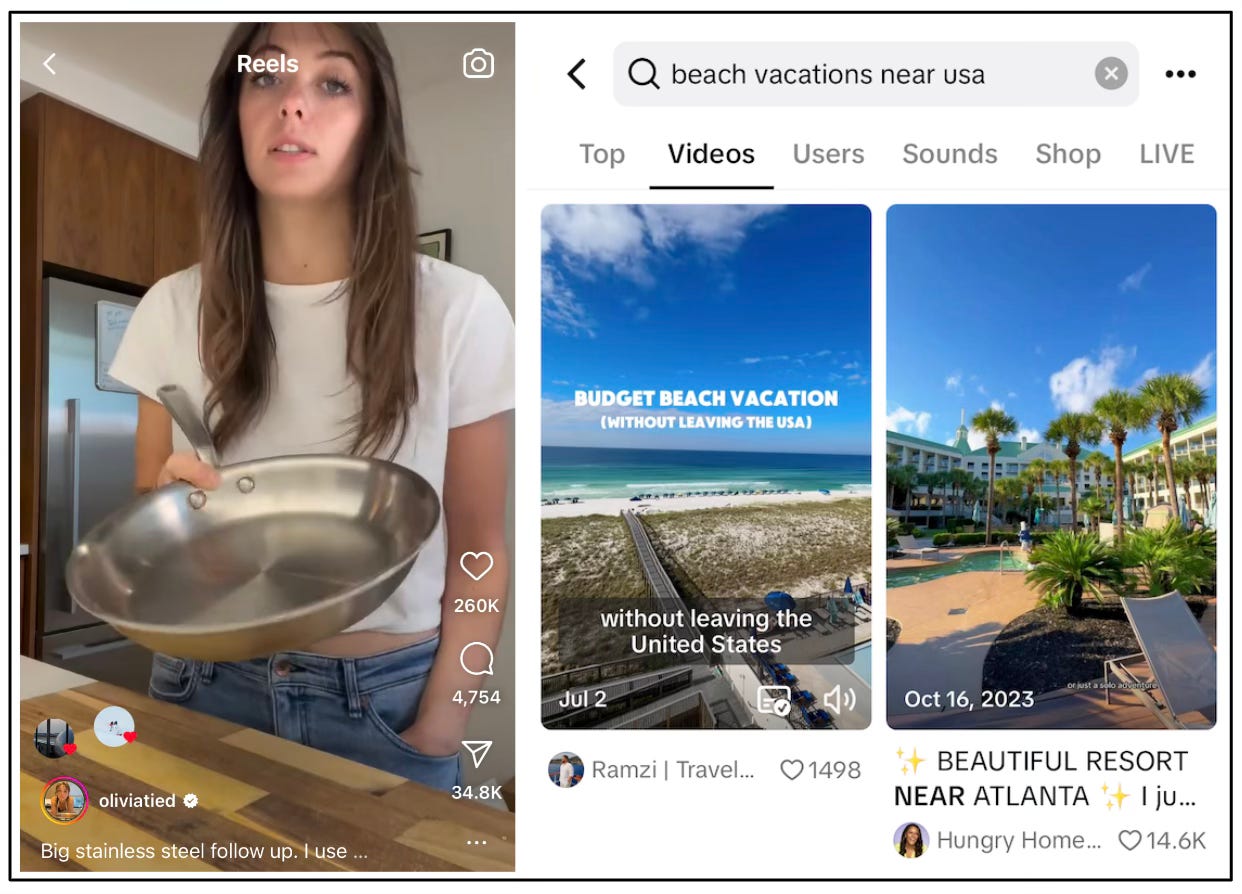Creators, Inspiration and the Coming Search Apocalypse.
AI may upend search, but individual content creators are likely to be more crucial in the future rather than less.
Welcome to Zero Draft, a (mostly) weekly newsletter about intersection of content, marketing, media and adventure.
A “zero draft” is an unstructured, preliminary draft of writing. This newsletter evolved out of a huge document where I’ve been unloading ideas, observations and article links about what’s happening in media and content marketing. A true “Zero Draft” you might say.
So without further ado… here’s where I think AI-driven search and the creator economy are about to collide with traditional publishing. Agree? Disagree? Send me a note and let’s discuss.
“The AI search apocalypse is coming.”
That’s the sentiment around many media brands these days, and unfortunately for many companies, the fear is not completely overblown.
But if a search traffic apocalypse is imminent, then which media brands are likely to be victims, and who steps into the vacuum it creates?
If a traffic apocalypse is imminent, then which media brands are likely to be victims, and who steps into the vacuum it creates?
In my opinion, the threat is indeed dire for companies that have built business around lower-value evergreen content, while opportunity is growing for independent personalities and dynamic video-first social creators.
That’s because multiple changes are occurring simultaneously — in particular social search continues to grow, while AI is about to reduce the relevance of lower-value content that has floated media and fulfilled a real user need for a long time.
On a recent podcast, Lenny Rachitsky and SEO expert Eli Schwartz explored potential impacts of Gemini, Perplexity and other AI-driven zero-click search products. One of Schwartz’s predictions is that AI-driven search will displace long-form, top-of-funnel “discovery” content, but have less impact on mid-funnel search.
Schwartz’s hypothetical example is that Gemini could provide a user with a great summary of beach destinations within a 2-hour flight of the US, which means that the media that once monetized travel listicles, overviews and inspiration become less relevant. AI will summarize the information, provide minimal or no citations, Google will display it at the top of the page, and the relevant travel articles will be pushed way down the SERP.
But, he argues, search traffic will still be vital for mid-funnel search. Hence, once AI convinces you Cancun is the spot, then search (and more traditional SEO) will continue to define how you pick your hotel.
Many user journeys are more of like a circuitous information-gathering journey than a mechanistic path through various purchase options.
At the end of the episode, though, the discussion comes back to travel search, and this time they get closer to what I think is the best way to think about discovery, inspiration, and why creators are poised to succeed, even as media gets squeezed.
Schwartz points out the absolutely central role social media and creators play in inspiring the user journey, citing data from the Google antitrust case that 63% of Gen Z searches using TikTok.
There’s ample evidence that social continues to encroach on what was once traditionally search’s territory, as Emarketer (see charts above) and plenty of other sources have shown.
In this vision, the search begins on social media, then moves to Google for the specifics. But even this focus on social search shorts the real impact of creator-driven content on the user journey.
Many user journeys are more of a circuitous information-gathering journey than a mechanistic path through various purchase options.
How did the user decide to search for a beach instead of mountains or a city? After they started dreaming, how many nudges does a person need before they decide to make the search that results in booking? Why do we assume that people start their search broad and then narrow to specifics? Rather than starting with beach vacation within 2 hours of the US, perhaps the user saw a destination on Instagram and started the journey at the specific hotel level, then worked upward to the general vacation idea.
It’s entirely plausible to enter the funnel at the bottom: “I saw a chef cooking with a beautiful pan on Instagram and I want it.” Or that the video triggered the general question — What are the advantages of stainless steel pans? — which only comes back to brands weeks or months later, after countless exposures on TikTok and YouTube.
Rand Fishkin has pointed out that search traffic is the result of doing everything else well. We will never know which exposure to an idea moved someone to action, because the informational journey is so complex. It’s some combination of inspiration, reminders, nudges and staying in front of people.
It seems likely that AI search challenges a layer of content currently fulfilled by traditional media, and that we’re likely to see users move from creator-driven content to mid-funnel Google search and back to social. You still have to deliver on SEO, but search itself played a minimal role in the inspiration and information gathering process.
Content creators win at guiding people through the information journey, reminding them that you exist and providing frequent nudges within the platforms your audience is already using.
To me, this frames the right way to think about where creators fit in a strategy. Yes, some creators in some niches can win as affiliates, but individual creators usually shine in making and distributing discovery-level storytelling that pays off down the line.
Creators, and social algorithms, are great at keeping relevant ideas top of mind, reminding users to keep thinking about your brand. They win at guiding people through an informational journey, reminding them that you exist and providing frequent nudges within the platforms your audience is already using.
It takes confidence to stick with storytelling over longer periods of time, rather than get sucked entirely into the most easily measurable, performance-driven channels. But as Nike was kind enough to show us recently, eventually too much focus on performance chokes off your audience and leaves you wide open to new competitors.
The informational journey is changing, and traditional media may struggle to retain traffic as intermediaries, but all the change just emphasizes the importance of social and creator content to build inspirational stories at the beginning of the user journey.
TLDR
AI & zero-click search may well displace top-of-funnel media content.
But, social search is taking the place of that user experience, with people increasingly looking to TikTok, Reels and YouTube rather than traditional media articles found via Google.
Social media creators excel at exactly the kinds of inspirational storytelling that motivates users and keeps brands relevant.
The journey is often more of a circuitous search for information than a direct path to purchase. Great content keeps your brand present in all those steps, and on the platforms where your audience is already engaged.
It takes confidence and time to build long-lasting, content-driven communities, but the alternative slowly erodes your most loyal communities.






Great read, Pat!